Huang He
ERNIE 5.0 Technical Report
Feb 04, 2026Abstract:In this report, we introduce ERNIE 5.0, a natively autoregressive foundation model desinged for unified multimodal understanding and generation across text, image, video, and audio. All modalities are trained from scratch under a unified next-group-of-tokens prediction objective, based on an ultra-sparse mixture-of-experts (MoE) architecture with modality-agnostic expert routing. To address practical challenges in large-scale deployment under diverse resource constraints, ERNIE 5.0 adopts a novel elastic training paradigm. Within a single pre-training run, the model learns a family of sub-models with varying depths, expert capacities, and routing sparsity, enabling flexible trade-offs among performance, model size, and inference latency in memory- or time-constrained scenarios. Moreover, we systematically address the challenges of scaling reinforcement learning to unified foundation models, thereby guaranteeing efficient and stable post-training under ultra-sparse MoE architectures and diverse multimodal settings. Extensive experiments demonstrate that ERNIE 5.0 achieves strong and balanced performance across multiple modalities. To the best of our knowledge, among publicly disclosed models, ERNIE 5.0 represents the first production-scale realization of a trillion-parameter unified autoregressive model that supports both multimodal understanding and generation. To facilitate further research, we present detailed visualizations of modality-agnostic expert routing in the unified model, alongside comprehensive empirical analysis of elastic training, aiming to offer profound insights to the community.
Distributional Clarity: The Hidden Driver of RL-Friendliness in Large Language Models
Jan 11, 2026Abstract:Language model families exhibit striking disparity in their capacity to benefit from reinforcement learning: under identical training, models like Qwen achieve substantial gains, while others like Llama yield limited improvements. Complementing data-centric approaches, we reveal that this disparity reflects a hidden structural property: \textbf{distributional clarity} in probability space. Through a three-stage analysis-from phenomenon to mechanism to interpretation-we uncover that RL-friendly models exhibit intra-class compactness and inter-class separation in their probability assignments to correct vs. incorrect responses. We quantify this clarity using the \textbf{Silhouette Coefficient} ($S$) and demonstrate that (1) high $S$ correlates strongly with RL performance; (2) low $S$ is associated with severe logic errors and reasoning instability. To confirm this property, we introduce a Silhouette-Aware Reweighting strategy that prioritizes low-$S$ samples during training. Experiments across six mathematical benchmarks show consistent improvements across all model families, with gains up to 5.9 points on AIME24. Our work establishes distributional clarity as a fundamental, trainable property underlying RL-Friendliness.
Query Enhanced Knowledge-Intensive Conversation via Unsupervised Joint Modeling
Dec 19, 2022



Abstract:The quality of knowledge retrieval is crucial in knowledge-intensive conversations. Two common strategies to improve the retrieval quality are finetuning the retriever or generating a self-contained query, while they encounter heavy burdens on expensive computation and elaborate annotations. In this paper, we propose an unsupervised query enhanced approach for knowledge-intensive conversations, namely QKConv. There are three modules in QKConv: a query generator, an off-the-shelf knowledge selector, and a response generator. Without extra supervision, the end-to-end joint training of QKConv explores multiple candidate queries and utilizes corresponding selected knowledge to yield the target response. To evaluate the effectiveness of the proposed method, we conducted comprehensive experiments on conversational question-answering, task-oriented dialogue, and knowledge-grounded conversation. Experimental results demonstrate that QKConv achieves state-of-the-art performance compared to unsupervised methods and competitive performance compared to supervised methods.
PLATO-K: Internal and External Knowledge Enhanced Dialogue Generation
Nov 02, 2022



Abstract:Recently, the practical deployment of open-domain dialogue systems has been plagued by the knowledge issue of information deficiency and factual inaccuracy. To this end, we introduce PLATO-K based on two-stage dialogic learning to strengthen internal knowledge memorization and external knowledge exploitation. In the first stage, PLATO-K learns through massive dialogue corpora and memorizes essential knowledge into model parameters. In the second stage, PLATO-K mimics human beings to search for external information and to leverage the knowledge in response generation. Extensive experiments reveal that the knowledge issue is alleviated significantly in PLATO-K with such comprehensive internal and external knowledge enhancement. Compared to the existing state-of-the-art Chinese dialogue model, the overall engagingness of PLATO-K is improved remarkably by 36.2% and 49.2% on chit-chat and knowledge-intensive conversations.
Q-TOD: A Query-driven Task-oriented Dialogue System
Oct 14, 2022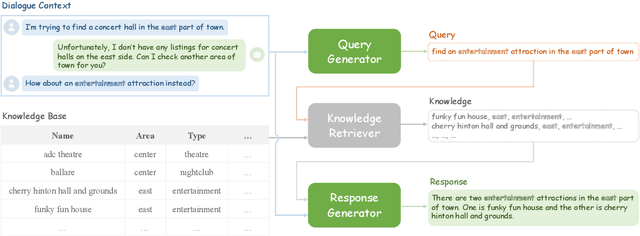
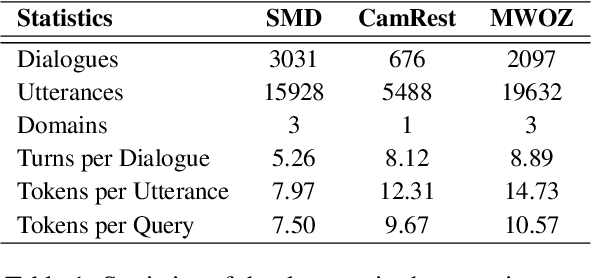
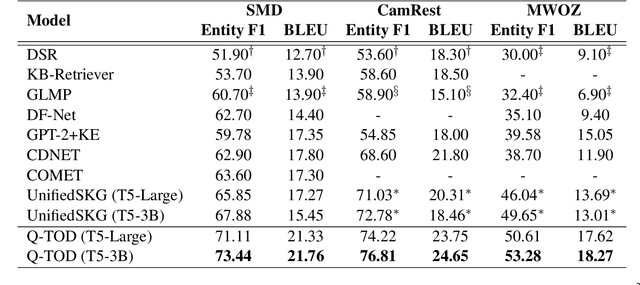
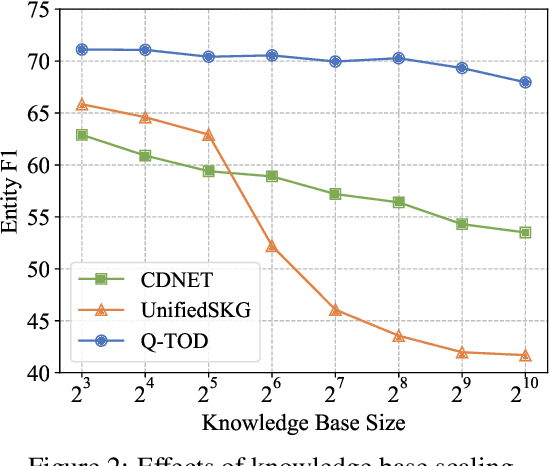
Abstract:Existing pipelined task-oriented dialogue systems usually have difficulties adapting to unseen domains, whereas end-to-end systems are plagued by large-scale knowledge bases in practice. In this paper, we introduce a novel query-driven task-oriented dialogue system, namely Q-TOD. The essential information from the dialogue context is extracted into a query, which is further employed to retrieve relevant knowledge records for response generation. Firstly, as the query is in the form of natural language and not confined to the schema of the knowledge base, the issue of domain adaption is alleviated remarkably in Q-TOD. Secondly, as the query enables the decoupling of knowledge retrieval from the generation, Q-TOD gets rid of the issue of knowledge base scalability. To evaluate the effectiveness of the proposed Q-TOD, we collect query annotations for three publicly available task-oriented dialogue datasets. Comprehensive experiments verify that Q-TOD outperforms strong baselines and establishes a new state-of-the-art performance on these datasets.
Towards Boosting the Open-Domain Chatbot with Human Feedback
Aug 30, 2022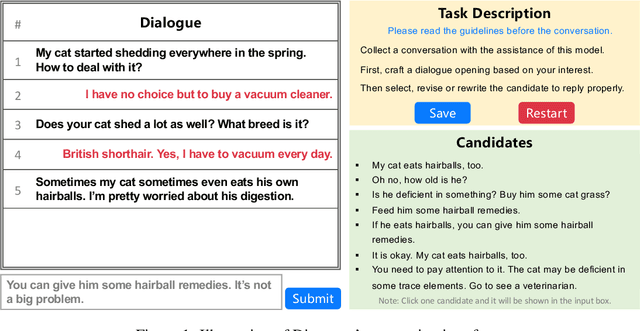



Abstract:Many open-domain dialogue models pre-trained with social media comments can generate coherent replies but have difficulties producing engaging responses when interacting with real users. This phenomenon might mainly result from the deficiency of annotated human-human conversations and the misalignment with human preference. In this paper, we propose a novel and efficient approach Diamante to boost the open-domain chatbot, where two kinds of human feedback (including explicit demonstration and implicit preference) are collected and leveraged. By asking annotators to select or amend the model-generated candidate responses, Diamante efficiently collects the human demonstrated responses and constructs a Chinese chit-chat dataset. To enhance the alignment with human preference, Diamante leverages the implicit preference in the data collection process and introduces the generation-evaluation joint training. Comprehensive experiments indicate that the Diamante dataset and joint training paradigm can significantly boost the performance of Chinese pre-trained dialogue models.
Towards Building an Open-Domain Dialogue System Incorporated with Internet Memes
Mar 08, 2022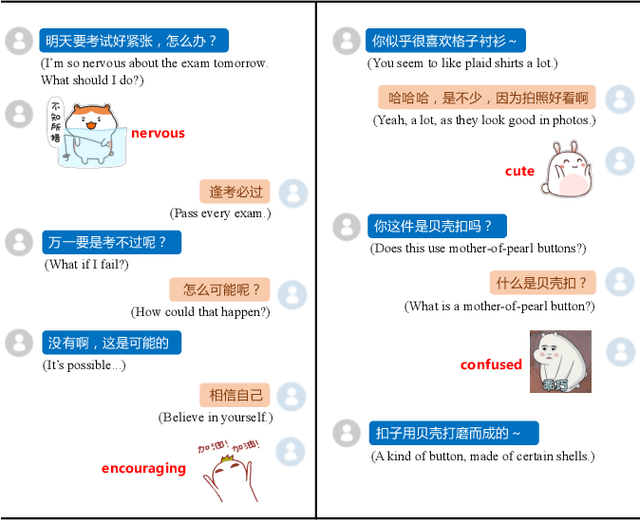

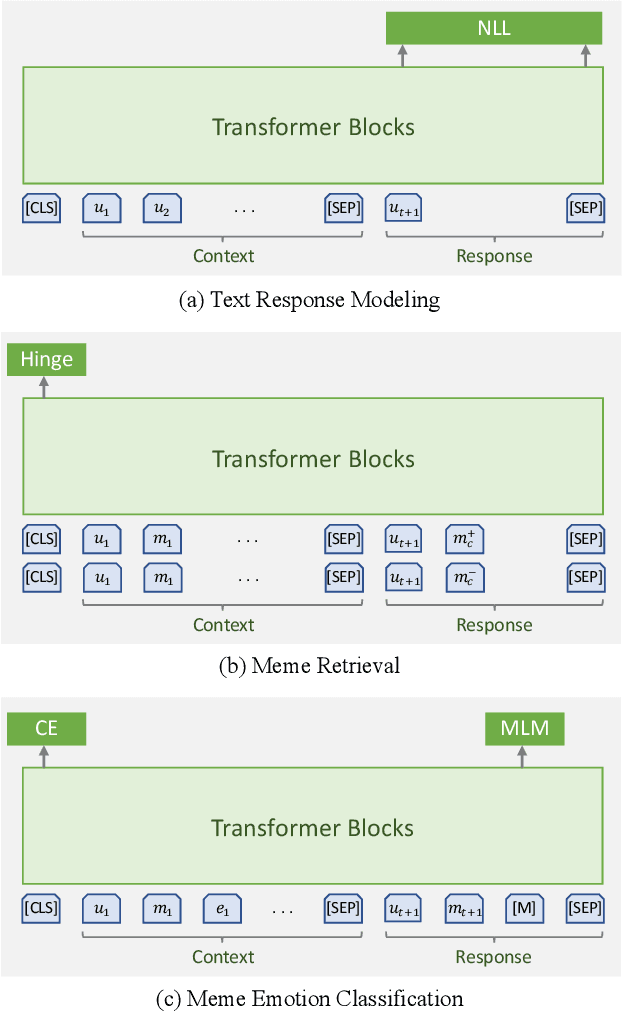
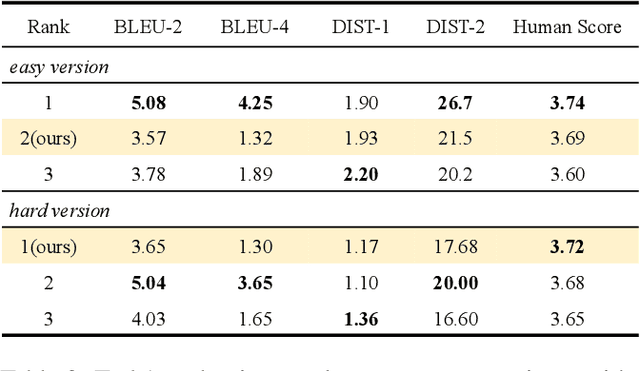
Abstract:In recent years, Internet memes have been widely used in online chatting. Compared with text-based communication, conversations become more expressive and attractive when Internet memes are incorporated. This paper presents our solutions for the Meme incorporated Open-domain Dialogue (MOD) Challenge of DSTC10, where three tasks are involved: text response modeling, meme retrieval, and meme emotion classification. Firstly, we leverage a large-scale pre-trained dialogue model for coherent and informative response generation. Secondly, based on interaction-based text-matching, our approach can retrieve appropriate memes with good generalization ability. Thirdly, we propose to model the emotion flow (EF) in conversations and introduce an auxiliary task of emotion description prediction (EDP) to boost the performance of meme emotion classification. Experimental results on the MOD dataset demonstrate that our methods can incorporate Internet memes into dialogue systems effectively.
TOD-DA: Towards Boosting the Robustness of Task-oriented Dialogue Modeling on Spoken Conversations
Dec 23, 2021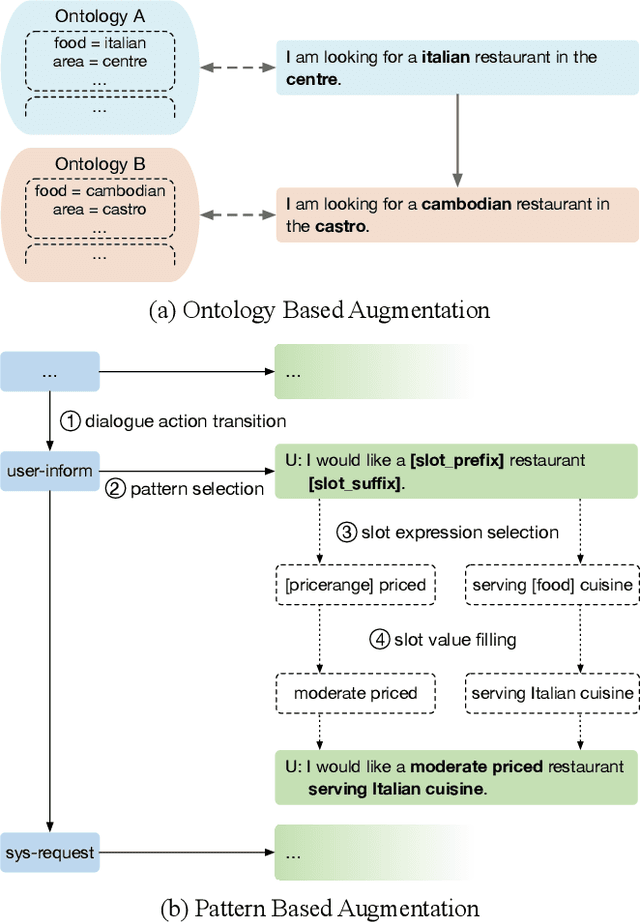
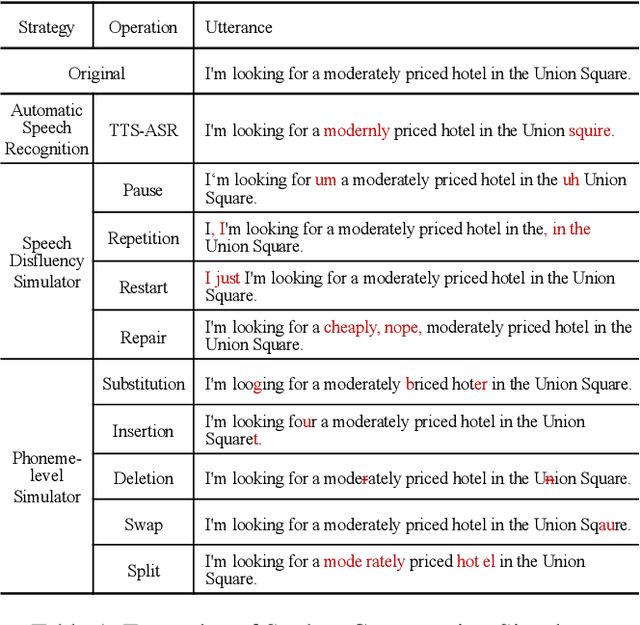

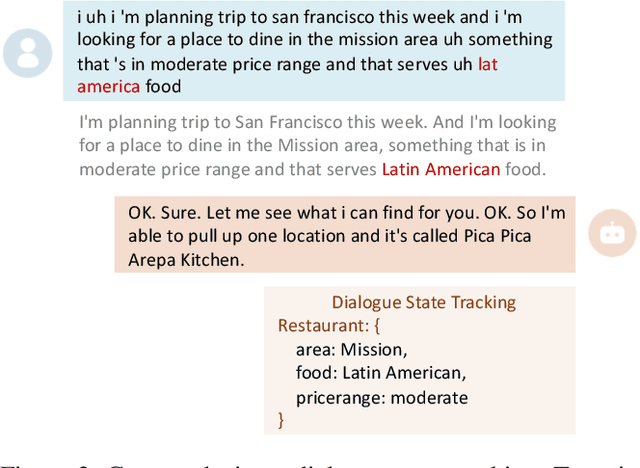
Abstract:Task-oriented dialogue systems have been plagued by the difficulties of obtaining large-scale and high-quality annotated conversations. Furthermore, most of the publicly available datasets only include written conversations, which are insufficient to reflect actual human behaviors in practical spoken dialogue systems. In this paper, we propose Task-oriented Dialogue Data Augmentation (TOD-DA), a novel model-agnostic data augmentation paradigm to boost the robustness of task-oriented dialogue modeling on spoken conversations. The TOD-DA consists of two modules: 1) Dialogue Enrichment to expand training data on task-oriented conversations for easing data sparsity and 2) Spoken Conversation Simulator to imitate oral style expressions and speech recognition errors in diverse granularities for bridging the gap between written and spoken conversations. With such designs, our approach ranked first in both tasks of DSTC10 Track2, a benchmark for task-oriented dialogue modeling on spoken conversations, demonstrating the superiority and effectiveness of our proposed TOD-DA.
Amendable Generation for Dialogue State Tracking
Oct 29, 2021
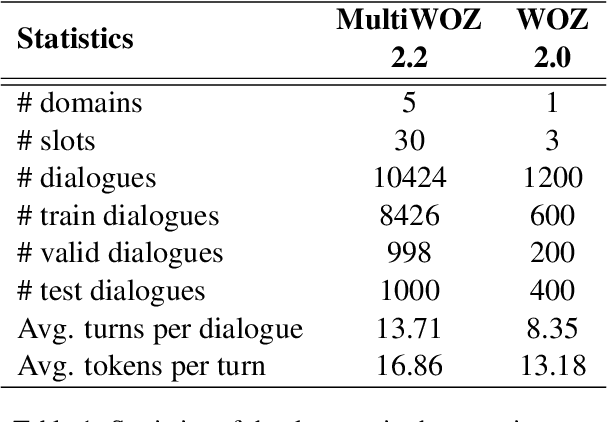
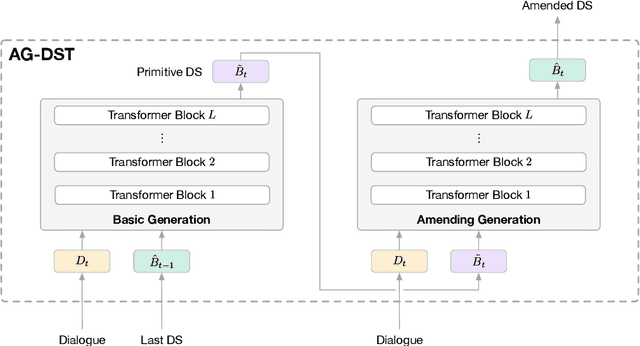
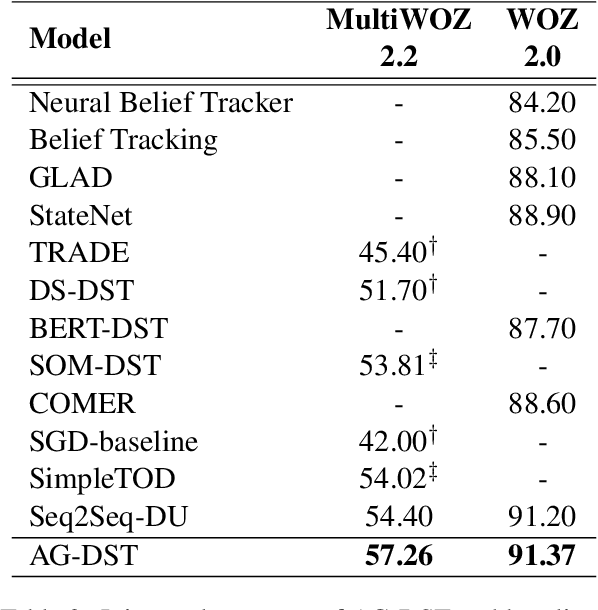
Abstract:In task-oriented dialogue systems, recent dialogue state tracking methods tend to perform one-pass generation of the dialogue state based on the previous dialogue state. The mistakes of these models made at the current turn are prone to be carried over to the next turn, causing error propagation. In this paper, we propose a novel Amendable Generation for Dialogue State Tracking (AG-DST), which contains a two-pass generation process: (1) generating a primitive dialogue state based on the dialogue of the current turn and the previous dialogue state, and (2) amending the primitive dialogue state from the first pass. With the additional amending generation pass, our model is tasked to learn more robust dialogue state tracking by amending the errors that still exist in the primitive dialogue state, which plays the role of reviser in the double-checking process and alleviates unnecessary error propagation. Experimental results show that AG-DST significantly outperforms previous works in two active DST datasets (MultiWOZ 2.2 and WOZ 2.0), achieving new state-of-the-art performances.
PLATO-XL: Exploring the Large-scale Pre-training of Dialogue Generation
Sep 20, 2021



Abstract:To explore the limit of dialogue generation pre-training, we present the models of PLATO-XL with up to 11 billion parameters, trained on both Chinese and English social media conversations. To train such large models, we adopt the architecture of unified transformer with high computation and parameter efficiency. In addition, we carry out multi-party aware pre-training to better distinguish the characteristic information in social media conversations. With such designs, PLATO-XL successfully achieves superior performances as compared to other approaches in both Chinese and English chitchat. We further explore the capacity of PLATO-XL on other conversational tasks, such as knowledge grounded dialogue and task-oriented conversation. The experimental results indicate that PLATO-XL obtains state-of-the-art results across multiple conversational tasks, verifying its potential as a foundation model of conversational AI.
 Add to Chrome
Add to Chrome Add to Firefox
Add to Firefox Add to Edge
Add to Edge